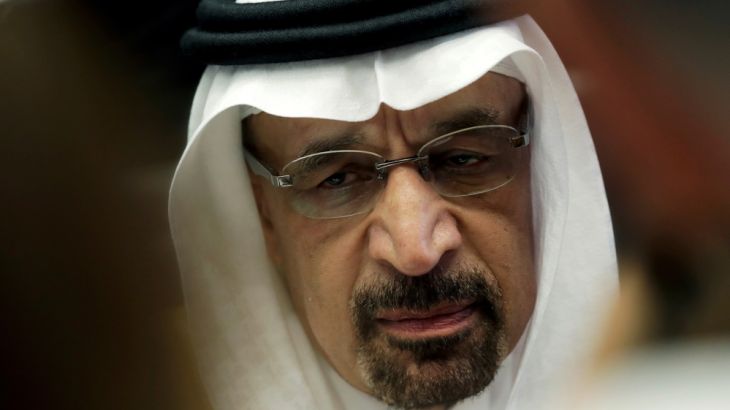
Why was Saudi Arabia’s oil minister fired?
As the kingdom struggles with subdued oil prices, will the new minister fare better? Plus, climate change adaptation.
He was the de-facto leader of OPEC and the most respected oilman in Saudi Arabia and on the world stage. So well respected that when crown prince Mohammed bin Salman needed to salvage his credibility after the killing of journalist Jamal Khashoggi, it was energy minister Khalid al-Falih who he turned to.
But in a surprise move, he was ousted and replaced by Prince Abdulaziz bin Salman, a half-brother of MBS.
Keep reading
list of 4 itemsChina’s economy beats expectations, growing 5.3 percent in first quarter
Inside the pressures facing Quebec’s billion-dollar maple syrup industry
Manipur’s BJP CM inflamed conflict: Assam Rifles report on India violence
It is the first time that a member of the ruling Saudi family has been appointed to the post. Technocrats like al-Falih have always been the nation’s choice to run the oil ministry.
Al-Falih was also relieved from his role as chairman of the state-owned oil giant Aramco.
Saudi Arabia has a 13 percent share of the world’s petroleum market. During al-Falih’s tenure, he struggled to raise the price of oil to $80.
That price would give Mohammed bin Salman the financial firepower to transform the economy, moving it away from its oil addiction. It would also enable it to balance its budget and not exhaust foreign reserves on imports.
Oil is crucial to Saudi Arabia. It accounts for 40 percent of its economy, 70 percent of government revenue and nearly 80 percent of export earnings.
According to Reuters, Saudi export earnings from oil fell from more than $800m a day in April 2014 to less than $300m per day in February 2016 – due to the shale oil boom in the United States. In June this year, it was earning $400m a day.
Saudi Arabia has used everything in its policy toolbox to raise prices. Al-Falih elicited the help of Russia and other non-OPEC nations to cut production. Saudi Arabia cut its own production to its lowest level in five years – to no avail.
It also needs high oil prices to meet the ambitious $2 trillion valuation for Saudi Aramco’s stock market listing early next year.
At the moment, analysts believe the world’s most profitable company is worth between $1 trillion to $1.5 trillion. But MBS wants a higher valuation and on that count al-Falih also failed to deliver.
“Saudi Arabia has ambitious investment plans, vision 2030, and other areas and so I think certainly the slow progress, as probably the Saudis would see it, towards achieving a more balanced market and the price increase they would expect to come with that is going to be a big part of what has driven this change,” Richard Mallinson, senior analyst and the co-founder of Energy Aspects, tells Counting the Cost.
According to Mallinson, Prince Abdulaziz is “very deeply involved in the (oil) industry” and is perceived “as a safe pair of hands and experienced person when it comes to oil markets”.
“So I think the fact that he is a prince and the fact that he is the half-brother of the crown prince isn’t the relevant factor here, it is much more that he is knowledgeable about the portfolio and he is seen as someone who won’t rock the boat when it comes to policy,” says Mallison.
“I don’t think we will see a dramatically different policy. I think we may see a different style of communication perhaps, maybe a move back towards an approach we saw in the past from Saudi Arabia where there was less talk, less comment to the press. There was a narrower focus on a message that the kingdom wants to communicate to oil markets.”
The economic cost of adapting for a warming planet
Earlier this year, the California-based utility Pacific Gas and Electric filed for bankruptcy protection as costs related to wildfires ballooned.
It was probably one of the clearest cases of how climate change wiped out a company that had not done enough to prepare for a warming planet.
Addressing climate change mitigation and addressing climate change adaptation is in the interest of all countries and in the interest of all companies.
PG&E faced approximately $30bn in liabilities as a result of its role in the 2017 and 2018 fires.
Federal judge William Alsup blamed the cause of some of the fires on the utility’s negligence. The judge also said the utility had paid $4.5bn to shareholders in dividends over the past five years while failing to take adequate safety precautions.
And Germany’s car industry is facing up to the threat of losing its crown as the leading centre for production. A series of missteps – from diesel-cheating scandals to a lack of preparedness for the end of the combustion engine – has left the road open to Uber, Tesla and Chinese electric brands. An industry that employs more than 800,000 people is facing a make-or-break moment.
Both cases raise many questions: Are businesses doing enough to prepare for climate change or do executives have their heads in the sand?
Our economics editor Abid Ali talks to Feike Sijbesma, chief executive of Dutch life sciences company Royal DSM, about climate change adaptation and why it is important for businesses – despite a lack of political will from the likes of US President Donald Trump who withdrew from the Paris climate change accord.
German automakers face up to climate change and other challenges
Germany‘s BMW has been one of the earlier movers in producing electric cars. It currently stands fourth behind Tesla and two Chinese companies in terms of sales.
Al Jazeera’s Dominic Kane speaks with BMW board member Pieter Nota at the Frankfurt Motor Show about BMW’s electric car production and other challenges the industry is facing.